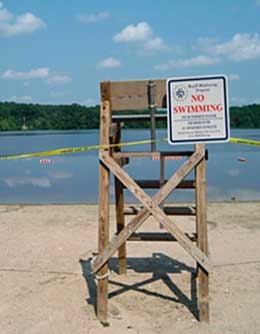
The RI Department of Health (RIDOH) does not regularly monitor surface water at freshwater bathing beaches. Owners of licensed freshwater beaches are required to monitor water quality; however, beaches only need to be licensed if one or more of the following criteria applies: access fees are charged, the beach is part of a private club membership, or more than ten children use the beach.
These owners must perform regular testing from Memorial Day to Labor Day, and follow RIDOH’s standards and protocols. As with saltwater beach monitoring, required freshwater beach monitoring measures the presence of the bacterium Enterococci, which is used as an indicator to determine safe water quality conditions. The concentration of Enterococci bacteria in beach water samples is measured in cfu/100ml (colony forming units per 100 milliliters). Beach closures occur when samples levels exceed 60 cfu/100 ml, and the beach may be reopened when subsequent testing shows Enterococci below this level.
RIDOH does not conduct a freshwater beach monitoring program independent of those done by licensed beach owners, largely due to a lack of resources. RIDOH receives funding from the EPA specifically designated for saltwater beach monitoring, but no such funding source currently exists for monitoring freshwater beaches. It is critical that recreational swimmers are aware of this situation, a caveat emptor of those hoping to enjoy Rhode Island’s natural resources.
Implemented By
Licensed freshwater beach facility owners and operators, overseen by Rhode Island Department of Health.
